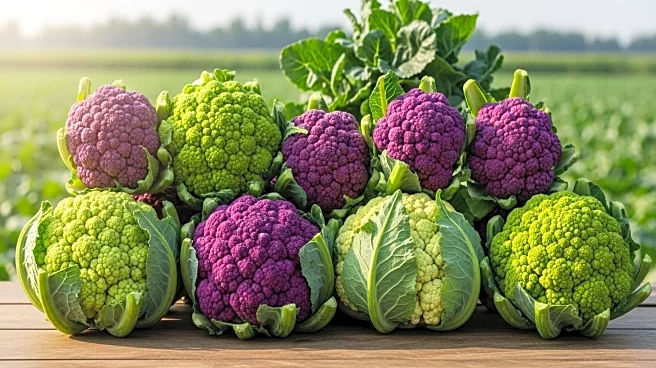What is the story about?
What's Happening?
Chinese cauliflower varieties have significantly improved agricultural practices in Pakistan, as reported by China Economic Net. The introduction of these seeds has transformed Pakistan's reliance on imported cauliflower seeds, with Chinese exports reaching 11 tonnes by mid-2025. This shift has positioned China as a major exporter of cauliflower seeds, which are now a significant part of China's vegetable seed export market. The seeds, developed by Sun Deling and his team at the Tianjin Academy of Agricultural Sciences, are noted for their affordability, high quality, and yield. Pakistani farmers, like Mohammad in Punjab, have reported increased revenues and satisfaction with the new varieties, which are better suited to local climatic conditions.
Why It's Important?
The introduction of Chinese cauliflower seeds in Pakistan represents a significant shift in agricultural dynamics, offering economic benefits to local farmers. By reducing dependency on expensive Western seeds, Pakistani farmers can increase their income and improve food security. The seeds' resilience to extreme weather conditions is particularly crucial in the face of climate change, providing a sustainable solution for farmers. This development also strengthens agricultural ties between China and Pakistan, potentially leading to further collaborations in agricultural research and development. The economic impact extends beyond individual farmers, potentially boosting the agricultural sector's contribution to Pakistan's GDP.
What's Next?
The success of Chinese cauliflower seeds in Pakistan may lead to expanded agricultural collaborations between China and other countries facing similar challenges. There is potential for establishing joint research laboratories within the Shanghai Cooperation Organization (SCO) member countries to further adapt these seeds to local climates. This could enhance the agricultural output and economic stability of small farmers across the region. Additionally, the increased availability of affordable, high-quality seeds may encourage more farmers to adopt these varieties, further transforming the agricultural landscape in Pakistan and beyond.
Beyond the Headlines
The introduction of Chinese cauliflower seeds in Pakistan highlights broader geopolitical and economic trends, such as China's growing influence in global agriculture. This development may prompt other countries to reconsider their agricultural import strategies and explore partnerships with China. The ethical implications of seed sovereignty and the potential for dependency on a single foreign supplier are also worth considering. As China continues to expand its agricultural exports, the balance of power in global seed markets may shift, raising questions about the long-term impacts on local farming communities and biodiversity.















